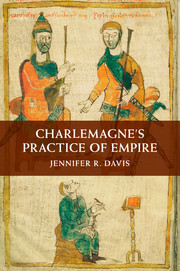Description
Charlemagne's Practice of Empire
Author: Davis Jennifer R.
A new interpretation of Charlemagne, examining how the Frankish king and his men learned to govern the first European empire.
Language: English
Subject for Charlemagne's Practice of Empire:
Approximative price 38.06 €
In Print (Delivery period: 14 days).
Add to cart
Charlemagne's Practice of Empire
Publication date: 06-2017
Support: Print on demand
Publication date: 06-2017
Support: Print on demand
Approximative price 161.04 €
In Print (Delivery period: 14 days).
Add to cart
Charlemagne's Practice of Empire
Publication date: 08-2015
Support: Print on demand
Publication date: 08-2015
Support: Print on demand
Description
/li>Contents
/li>Biography
/li>
Revisiting one of the great puzzles of European political history, Jennifer R. Davis examines how the Frankish king Charlemagne and his men held together the vast new empire he created during the first decades of his reign. Davis explores how Charlemagne overcame the two main problems of ruling an empire, namely how to delegate authority and how to manage diversity. Through a meticulous reconstruction based on primary sources, she demonstrates that rather than imposing a pre-existing model of empire onto conquered regions, Charlemagne and his men learned from them, developing a practice of empire that allowed the emperor to rule on a European scale. As a result, Charlemagne's realm was more flexible and diverse than has long been believed. Telling the story of Charlemagne's rule using sources produced during the reign itself, Davis offers a new interpretation of Charlemagne's political practice, free from the distortions of later legend.
Introduction; Part I. Strategic Rulership: Introduction: tools of control and coercion; 1. Managing royal agents; 2. Disciplining royal agents; 3. Fractured control: Charlemagne's response to dissent; Conclusion: control and its limits; Part II. Center and Region in Charlemagne's Empire: Introduction: unity and diversity in Charlemagne's empire; 4. An empire of regions?; 5. The conquered regions as arenas for experimentation; 6. The nature of the empire: centralization and communication; Conclusion: the imperial character of Charlemagne's realm; Part III. An Empire of Practice: Introduction: continuity, change, and the building of an empire; 7. The chronology of the reign; 8. Recta via: the dynamics of political change; Conclusion: an empire of practice; Conclusion: Charlemagne's invention of medieval rulership; Bibliography; Index.
Jennifer R. Davis is Assistant Professor of History and Director of Graduate Studies, as well as Associate Director of the Center for Medieval and Byzantine Studies, at the Catholic University of America, Washington DC. She was trained at Harvard University, Massachusetts and the University of Cambridge, receiving her Ph.D. from Harvard University in 2007. She is the co-editor, with Michael McCormick, of The Long Morning of Medieval Europe (2008). She is also the author of a number of articles on early medieval politics and on Charlemagne, as well as on Louis IX of France. Her current research is on the invention of the capitularies, a form of royal law, by the Merovingian Franks, and the transformation of these legal sources from the sixth to the twelfth centuries, based largely on the manuscript evidence. She has held fellowships from the Deutscher Akademischer Austauschdienst, the American Philosophical Society, the Kluge Center at the Library of Congress, and the American Academy in Rome, and was the holder of a Fulbright grant to France.
© 2024 LAVOISIER S.A.S.




